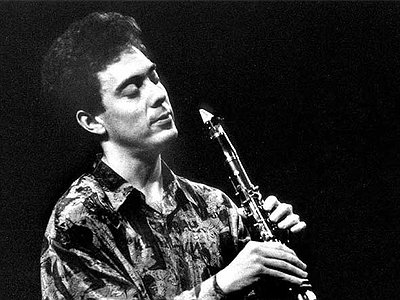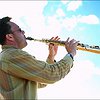The relationship between music and other forms of art – painting, video art and cinema most importantly - has become increasingly important. How do you see this relationship yourself and in how far, do you feel, does music relate to other senses than hearing alone?
Music should never just be the background to another art form, but should be an essential part of a total aesthetic.
How would you define the term “interpretation”? How important is it for you to closely work together with the artists performing your work?
I interpret the musicality of other creatures.
The effect of a piece doesn't merely depend on the performance of the musicians, but also on the place it is performed at. How do you see the relationship between location and sound? In how far do you feel the current system of concert halls is still the right one for your music – or for contemporary music in general?
Context can be many things. I want the right people to hear my music, those who can get the most out of it. That requires taking the music to all kinds of venues, from concert halls to conferences to museums and the internet.
The role of the composer has always been subject to change. What's your view on the (e.g. political/social/creative) tasks of composers today and how do you try to meet these goals in your work?
I want to change the way my audience sees and hears the world. There is so much recorded music instantaneously available today that people are rarely impressed by any new recording. Live events matter more than ever, and composers today need to be performers and presenters as much as writers.
How, do you feel, could contemporary compositions reach the attention of a wider audience?
By teaching people that much of it is far more accessible than they think it is.
Usually, it is considered that it is the job of the composer to win over an audience. But listening is also an active, rather than just a passive process. How do you see the role of the listener in the musical communication process?
We have so much sound today, so we must learn to be better listeners. As we consider the vast amount of available music, we need to listen more critically and comparatively to all at our disposal.
Music-sharing sites and -blogs as well as a flood of releases in general are presenting both listeners and artists with challenging questions. What's your view on the value of music today? In what way does the abundance of music change our perception of it?
We must earn access to the infinite by taking it all not for granted but all more seriously.
Composers have traditionally found it hard to secure a living with their art. What are the financial realities you're living with and in which way, do you feel, could they be improved?
I’m lucky, I’m a tenured professor. But I appreciate the financial struggles of those who need to earn more from their art. Commerce can be good for you. Yet always remember that what pays the most isn't always the best of your work. But it is certainly important work.
Please recommend two artists to our readers which you feel deserve their attention.
Norwegian jazz trumpeter Arve Henriksen
British underwater sound recordist Tom Lawrence
Angolan dance band Buraka som Sistema
Read and hear more David Rothenberg at davidrothenberg.wordpress.com



